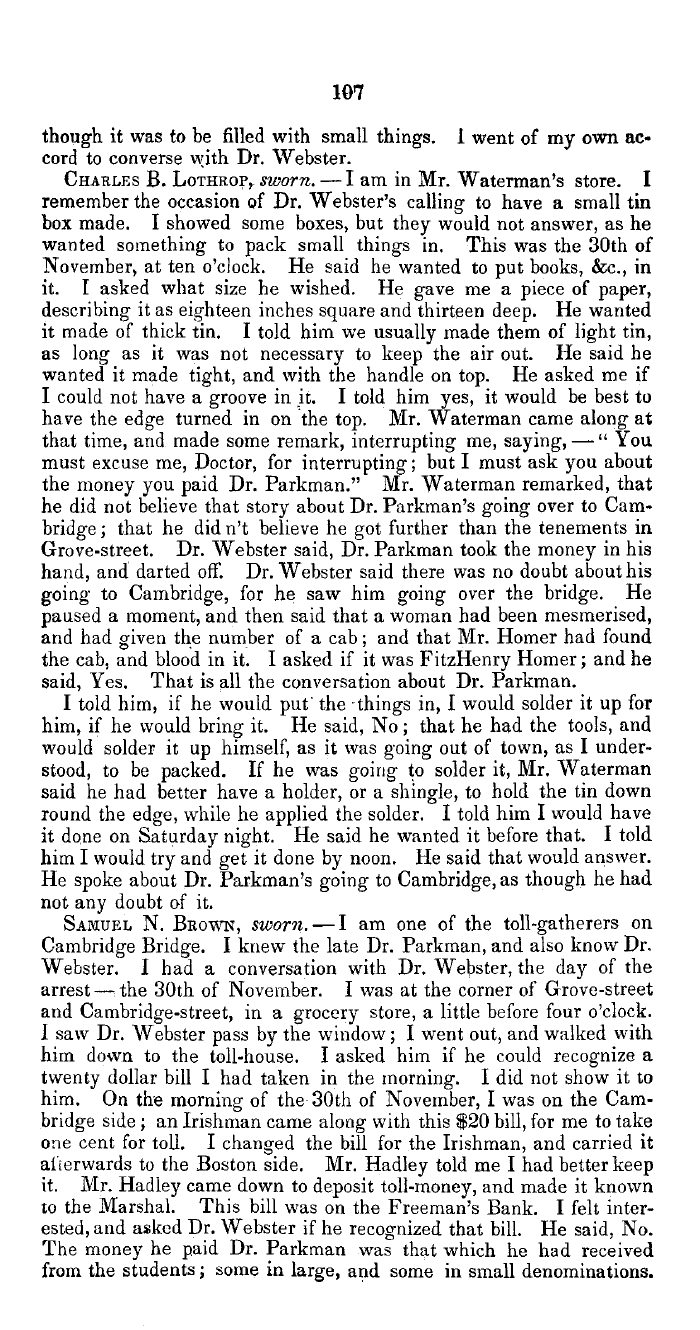|
1©7
though it was to be filled with small things. I went of my own ac.
cord to converse with Dr. Webster.
CHARLES B. LOTHROP,. sworn. -I am in Mr. Waterman's store. I
remember the occasion of Dr. Webster's calling to have a small tin
box made. I showed some boxes, but they would not answer, as he
wanted something to pack small things in. This was the 30th of
November, at ten o'clock. He said he wanted to put books, &c., in
it. I asked what size he wished. He gave me a piece of paper,
describing it as eighteen inches square and thirteen deep. He wanted
it made of thick tin. I told him we usually made them of light tin,
as long as it was not necessary to keep the air out. He said he
wanted it made tight, and with the handle on top. He asked me if
I could not have a groove in it. I told him yes, it would be best to
have the edge turned in on the top. Mr. Waterman came along at
that time, and made some remark, interrupting me, saying,-'1 You
must excuse me, Doctor, for interrupting; but I must ask you about
the money you paid Dr. Parkman." Mr. Waterman remarked, that
he did not believe that story about Dr. Parkman's going over to Cam-
bridge; that he didn't believe he got further than the tenements in
Grove-street. Dr. Webster said, Dr. Parkman took the money in his
hand, and darted off. Dr. Webster said there was no doubt about his
going to Cambridge, for he saw him going over the bridge. He
paused a moment, and then said that a woman had been mesmerised,
and had given the number of a cab; and that Mr. Homer had found
the cab, and blood in it. I asked if it was FitzHenry Homer; and he
said, Yes. That is all the conversation about Dr. Parkman.
I told him, if he would put the things in, I would solder it up for
him, if he would bring it. He said, No; that he had the tools, and
would solder it up himself, as it was going out of town, as I under-
stood, to be packed. If he was going to solder it, Mr. Waterman
said he had better have a holder, or a shingle, to hold the tin down
round the edge, while he applied the solder. I told him I would have
it done on Saturday night. He said he wanted it before that. I told
him I would try and get it done by noon. He said that would answer.
He spoke about Dr. Parkman's going to Cambridge, as though he had
not any doubt of it.
SAMUEL N. BROWN, sworn.- I am one of the toll-gatherers on
Cambridge Bridge. I knew the late Dr. Parkman, and also know Dr.
Webster. I had a conversation with Dr. Webster, the day of the
arrest-the 30th of November. I was at the corner of Grove-street
and Cambridge-street, in a grocery store, a little before four o'clock.
I saw Dr. Webster pass by the window; I went out, and walked with
him down to the toll-house. I asked him if he could recognize a
twenty dollar bill I had taken in the morning. I did not show it to
him. On the morning of the 30th of November, I was on the Cam-
bridge side; an Irishman came along with this $20 bill, for me to take
one cent for toll. I changed the bill for the Irishman, and carried it
afterwards to the Boston side. Mr. Hadley told me I had better keep
it. Mr. Hadley came down to deposit toll-money, and made it known
to the Marshal. This bill was on the Freeman's Bank. I felt inter-
ested, and asked Dr. Webster if he recognized that bill. He said, No.
The money he paid Dr. Parkman was that which he had received
from the students; some in large, and some in small denominations.
|

